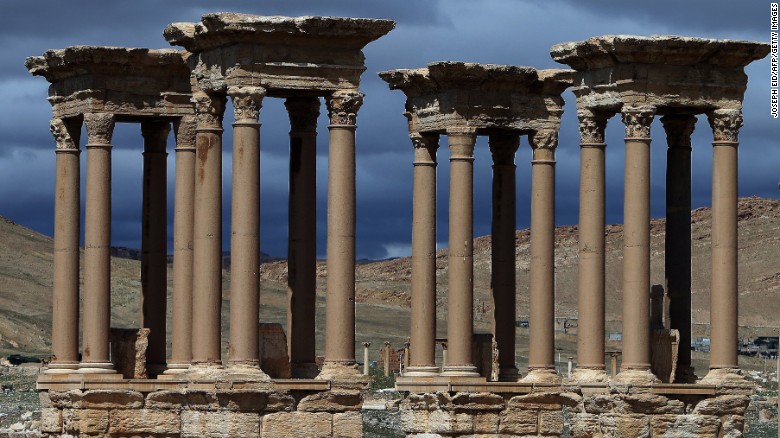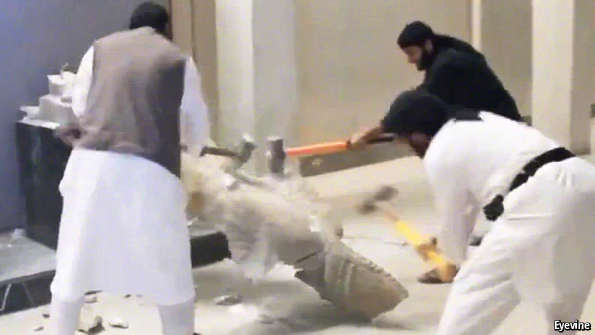Looted Art and Antiquities
"Islamic State operates like a diversified criminal business. They think like business people."
Louise Shelley, author Dirty Entanglements: Corruption, Crime and Terrorism, Turkey
"They bring in their own trucks, their own bulldozers, hire their own work crews and pay them salaries."
"The trafficking industry in Iraq and Syria is like what Hollywood is for Los Angeles. Just like everyone is an aspiring actor in L.A., everyone in Syria and Iraq is a dealer in some trafficked goods."
"The people won't stop hustling until the war ends."
Amr Al Azm, anthropology professor, Shawnee State University, Ohio
"Shady dealers sit on smuggled items for years to launder the provenance before trying to sell them for lump sums. There's enough awareness among major auction houses such as Sotheby's and Christie's to avoid handling any antiquity believed to be from Iraq or Syria."
"But the challenge is monitoring private sales, which are driving the global antiquities market. I'm pretty confident those pieces from Iraq and Syria are being sold to locals in the region -- wealthy Saudis, Emiratis, Iranians."
James McAndrew, formerly with U.S. Customs and Department of Homeland Security
"The best way to stop this is by intercepting the items before they end up in the freeports."
Daniel Brazier, U.S. Homeland Security
"If we can hold the material inside Syria and Iraq, ISIL can't get the money for it and it will make it easier for the world to repatriate the antiquities when the conflict ends."
Michael Danti, adviser, U.S. State Department
"Any terrorist organization or rogue state, even going back to the Nazis, who are looting and trafficking art, are looking for quick cash."
"The ultimate destination for valuable antiquities is the West, and people here are more aware now than they were in the 20th Century."
Christopher Marinello, chief executive, Art Recovery
 |
| The Tetrapylon, Palmyra, Syria |
But then, second thoughts kicked in with the realization that the vast sums earned through the black market trade in petroleum resources with the capture and possession of oil fields in Iraq began to dry up as a result of the U.S.-led coalition bombings. So that it made sense to an otherwise-senseless campaign of ruination to preserve the objects and transport them for illegal sale in an underground economy trading in antiquities. In both of these enterprises, Turkey proved itself invaluable to Islamic State as a passage-intermediary.

The sophisticated public relations arm of Islamic State knows all about the use of social media, using WhatsApp and iPhones to transmit photos of ancient Mesopotamian objects of high value to prospective buyers prepared to smuggle them transiting Turkey or Lebanon in the process. Iraq and Syria have proved to be excellent sources of these peerless goods, so the sledgehammers and drills have been put aside for the greater goal of funding Islamic State pursuits. EBay and Facebook are also helpful in this regard for ISIL.
To the caliphate, the billion-dollar global antiquities market is a godsend, with eager buyers lining up for ownership of sought-after antiquities; some aware of the black market and ISIL connection, others perhaps not. Originally, a 20 percent tax was exacted and collected from diggers and dealers, and then ISIL realized they were sitting on a gold mine and began their own operations, cutting out the middlemen.
According to Michael Danti who advises the U.S. State Department on matters related to plundered antiquities emanating from Iraq and Syria, a complex chain involving a handful of brokers and dealers is complicit with ISIL, supplying them with these rare heritage objects. And, he points out the jihadis are themselves linked closely to Turkish crime networks. Smuggled into Turkey, artifacts are taken by a broker to cash them for resale to dealers.
 |
| Archaeologists Rene Teigjeler and Isber Sabrine look for looted antiquities at a market in Gaziantep, Turkey The Wall Street Journal |
Archaeologists have estimated that some $300-million worth of antiquities are in the process of flooding the market through Turkey, Lebanon and Jordan to benefit Islamic State of Iraq and the Levant. Cuneiform tablets, stamp seals, Greco-Roman coins are turning up in photos on the Internet. According to the U.S. International Trade Commission, between 2012 and 2013, declared antiquities from Iraq imported into the U.S. increased by 672 percent, and from Syria by 133 percent.
The United Nations Security Council adopted a resolution to ban the sale of antiquities from Syria and Iraq in response to the situation, while the U.S. House of Representatives passed legislation effectively ensuring it has become illegal to sell looted artifacts from Syria. UN diplomats were informed by chairwoman Deborah Lehr of the Antiquities Coalition that Archaeologists Without Borders will be in operation by September to centralize efforts to handle the situation.
Labels: Antiquities, Heritage, Iraq, Islamic State, Looting, Syria, Vandalization


<< Home